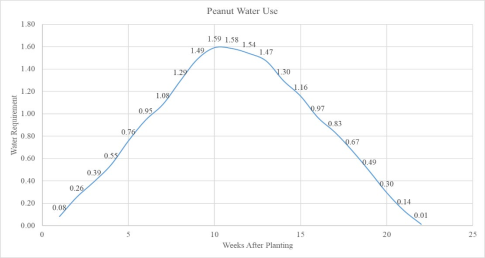August 2022 Peanut Pointers-Irrigation Update
By David Hall, Jason Mallard, and Wesley Porter
June was very hot and dry and provided some challenges, while it turned wet in certain areas of the
state. While, some areas have gotten rainfall, others have remained dry. The last week of July turned
hot and dry again. If peanuts were planted during the late-April or Early-May time frame they are at or
just moving out of peak water usage and some of the rains has helped to keep the water requirements
satisfied. However, don’t forget that over-irrigating peanuts can cause yield reductions so be careful
when deciding when to apply irrigation especially if it has been as wet as it has been in some areas
lately. A good soil water balance model or soil moisture sensors can really aid in building confidence on
when to apply those few small events to prevent yield loss, and when not to apply those events for the
same reason.
For weekly peanut water requirements, please refer to the graph below (the UGA Checkbook). Keep in
mind that these requirements are for peanuts that were planted between mid-April and mid-May and
that they are for both irrigation and rainfall. This graph should give you a good idea on where we stand
for the month of August. Most growers that planted in this time frame will reach peak water use during
the month of August and then the daily water use will slowly start to decline. DO NOT get behind on
irrigation as the weather can just as easily become hot and dry over the month of August. If you fall
behind with hot and dry weather it is difficult to catch up with irrigation only during peak demand. For
those of you using a soil moisture sensor or Irrigator Pro as your irrigation scheduling method, they will
definitely let you know if you get behind on irrigating and it will be a difficult challenge to get that soil
moisture back up with irrigation alone, especially with the deeper depths.
Figure 4. August weekly water requirements for peanuts
One point to keep in mind about using Irrigator Pro, especially if you’re a new user and this is your first
year running it, if you planted in the mid-April – mid-May window, you will hit the “R3 – Drying Out”
growth stage during the month of August, if you haven’t already. According to the crop model, this

growth stage will occur at roughly 95 DAP. You will notice that the app will tell you to stop irrigating for
about a week. This is to intentionally withhold water once a maximum fruit load occurs on the plant and
to stress the peanut plants so that it will stop flowering and allocate resources to maturing the peanuts
that are already on the plant. So, if you see this occur and feel like your field is getting dry, don’t panic
its part of the model and how the soil moisture needs to be handled to ensure the plant reacts
appropriately physiologically.
Additionally, with the high amounts of rainfall over the past month it has been very difficult to get
sprayers into the fields, thus, many growers may be considering chemigation. Chemigation through
pivots may not be for everyone but with possible disease and insect pressure and many acres to cover,
this practice may prove timesaving and effective. Especially with above and below ground white mold
appearing in many areas this year. The hot, humid, and wet environments are the perfect recipe for
disease issues. Remember, read the label to ensure the pesticide is approved for chemigation. Also, run
the pivot at 100 percent to apply the least amount of water while chemigating. If your system can not
apply 0.1” or less per revolution, chemigation is not recommended. Remember the goal of chemigation
is to apply chemical to the foliage of the plant, not the soil. This also means that a chemigation event
cannot accurately and validly be counted as an irrigation application. It is also very important to know
that your pivot is apply uniformly before considering injecting anything through it for application. So, if
you have not had a recent uniformity test performed on the system we strongly discourage the usage of
chemigation or fertigation.
If you have further questions about irrigation requirements, chemigation or fertigation reach out to your
local UGA County Extension Agent.